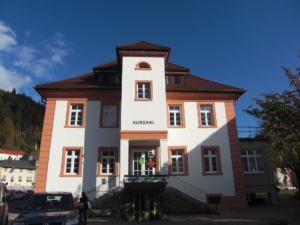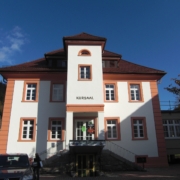The forgotten Kursaal – cure-all or curse for chancers and dancers?
Before the days of wild swimming and thalassotherapy, taking the waters meant going to a posh spa for a cure using the mineral springs and thermal baths found there, with the Kursaal being a focal point. In nineteenth century Europe spas, often called thermal baths, were elite hotspots with ballrooms, promenades,  and also casinos allowing visitors to take a bath in the financial sense. Spas were even haunts for artists, among them renowned Russian author Fyodor Dostoyevsky who lost money and found inspiration to write his novel The Gambler at Baden Baden in Germany, Europe’s foremost spa at the time. Surprisingly, contemporary medicine does now find real benefits to water therapies and bathing for a number of conditions, and the spa at Bath in England was found to effect real cures, possibly of conditions caused by lead poisoning.
and also casinos allowing visitors to take a bath in the financial sense. Spas were even haunts for artists, among them renowned Russian author Fyodor Dostoyevsky who lost money and found inspiration to write his novel The Gambler at Baden Baden in Germany, Europe’s foremost spa at the time. Surprisingly, contemporary medicine does now find real benefits to water therapies and bathing for a number of conditions, and the spa at Bath in England was found to effect real cures, possibly of conditions caused by lead poisoning.
The grand reception and entertainments building at a spa was called a Kursaal, meaning cure hall in German, though whether an on-site casino cured or cursed its patrons is a good question. Such buildings went up across Europe and even in England, usually actually called a Kursaal. Few buildings bear that name in Britain today, not simply because spas went out of fashion and found new uses, but also due to the first world war’s patriotic pressures to abandon German names, which even caused the royal family’s surname to transition from Battenberg to Windsor.
Britain’s best know surviving Kursaal is a listed building at Southend-on-sea in Essex, and there is even an electoral ward there named Kursaal, perhaps reflecting the unhealthy prevalence of casino capitalism in the twenty-first century United Kingdom. Kursaal has now been added to HE Translation’s growing list of German words used in English.




